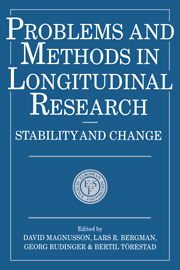Book contents
- Frontmatter
- Contents
- Contributors to this volume
- Foreword
- Preface
- 1 Studying individual development: problems and methods
- 2 Modeling individual and average human growth data from childhood to adulthood
- 3 Intraindividual variability in older adults' depression scores: some implications for developmental theory and longitudinal research
- 4 Now you see it, now you don't – some considerations on multiple regression
- 5 Differential development of health in a life-span perspective
- 6 Assessing change in a cohort-longitudinal study with hierarchical data
- 7 Statistical and conceptual models of ‘turning points’ in developmental processes
- 8 Qualitative analyses of individual differences in intra- individual change: examples from cognitive development
- 9 Application of correspondence analysis to a longitudinal study of cognitive development
- 10 Event-history models in social mobility research
- 11 Behavioral genetic concepts in longitudinal analyses
- 12 Genetic and environmental factors in a developmental perspective
- 13 Structural equation models for studying intellectual development
- 14 Longitudinal studies for discrete data based on latent structure models
- 15 Stability and change in patterns of extrinsic adjustment problems
- Index
8 - Qualitative analyses of individual differences in intra- individual change: examples from cognitive development
Published online by Cambridge University Press: 27 April 2010
- Frontmatter
- Contents
- Contributors to this volume
- Foreword
- Preface
- 1 Studying individual development: problems and methods
- 2 Modeling individual and average human growth data from childhood to adulthood
- 3 Intraindividual variability in older adults' depression scores: some implications for developmental theory and longitudinal research
- 4 Now you see it, now you don't – some considerations on multiple regression
- 5 Differential development of health in a life-span perspective
- 6 Assessing change in a cohort-longitudinal study with hierarchical data
- 7 Statistical and conceptual models of ‘turning points’ in developmental processes
- 8 Qualitative analyses of individual differences in intra- individual change: examples from cognitive development
- 9 Application of correspondence analysis to a longitudinal study of cognitive development
- 10 Event-history models in social mobility research
- 11 Behavioral genetic concepts in longitudinal analyses
- 12 Genetic and environmental factors in a developmental perspective
- 13 Structural equation models for studying intellectual development
- 14 Longitudinal studies for discrete data based on latent structure models
- 15 Stability and change in patterns of extrinsic adjustment problems
- Index
Summary
INTRODUCTION
The aim of the present chapter is twofold: on the one hand, qualitative analyses of individual developmental trajectories in cognition are presented; on the other hand, conceptual, methodological and statistical implications of the qualitative analysis of individual differences in intraindividual change are discussed. In contrast to the variable-oriented approaches most often applied in the analysis of individual development, a person- or individual-oriented approach will be used (Magnusson, 1985; Schröder, 1989). Person- or individual-oriented approaches are applied in clinical case studies, medical research and biostatistics, where the individual's patterns of characteristics, attributes or trajectories over time are the unit of analysis. This approach thus focuses mainly on configurations or constellations of attributes. In developmental research the individual-oriented approach is infrequent in spite of the fact that the empirical evaluation of important theories about development depends on the analysis of individual paths of development. Thus, for example, Piaget's theory of cognitive development postulates different stages or levels in cognitive development and that certain levels of cognitive functioning always precede, and are a necessary condition for, the emergence of subsequent levels of development (invariable developmental sequence). Empirically, questions concerning décalages in development and developmental sequences can be adequately evaluated only on the basis of the individual developmental patterns, since aggregate developmental curves for groups do not show how the individual develops over time (Bakan, 1967). Therefore, in this chapter we will use an analytical and methodological approach that is designed for the analysis of sequential data, in particular for the study of intraindividual change and intraindividual differences in development.
- Type
- Chapter
- Information
- Problems and Methods in Longitudinal ResearchStability and Change, pp. 166 - 189Publisher: Cambridge University PressPrint publication year: 1991
- 4
- Cited by

